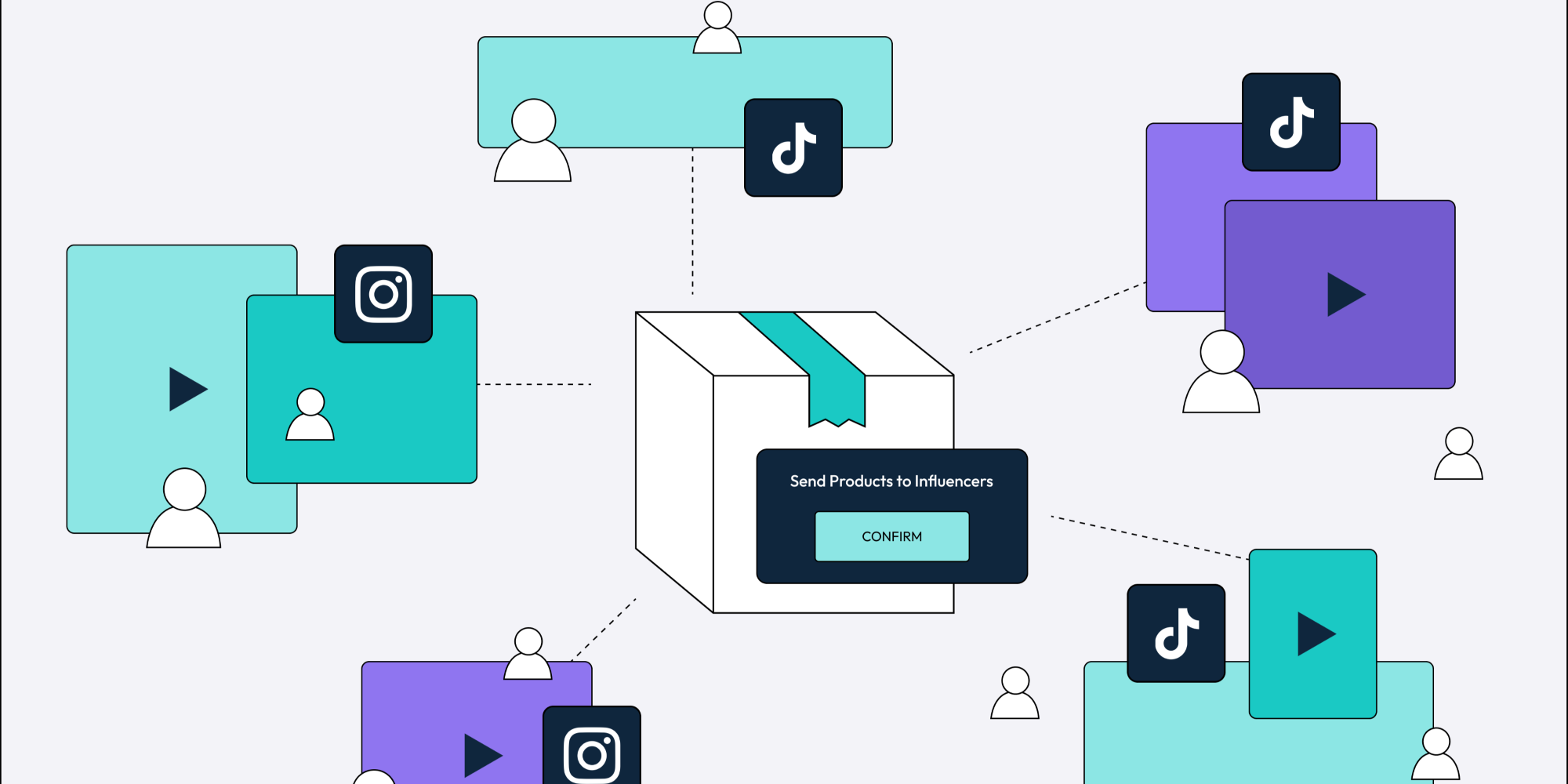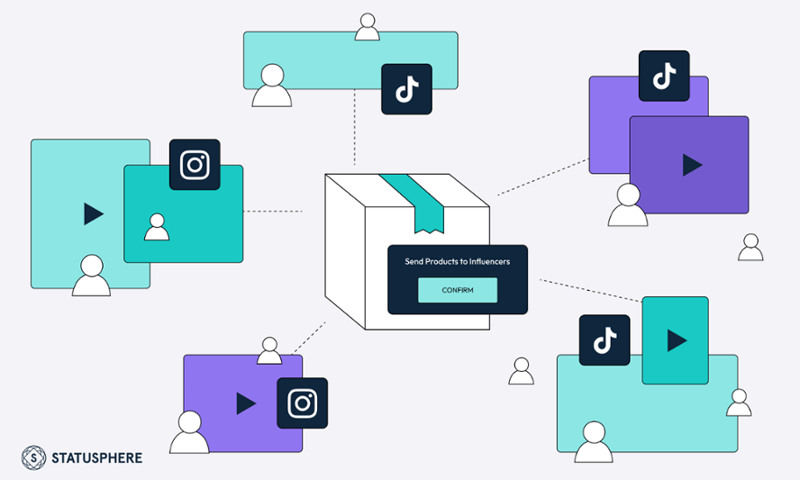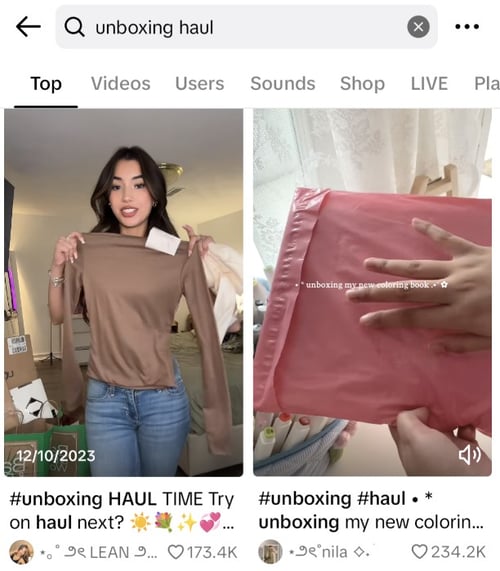8 Influencer Product Seeding Strategies That Actually Work
Want to ramp up your brand’s influencer seeding efforts? This post can help! Here are eight influencer seeding strategies and tips for earning...
Influencer product seeding is super effective if you have the right strategy. We explain why and how influencer seeding works and steps to improve your results.


Are you second-guessing if product seeding is worth it? If so, we get it!
Even brands that ship 1000s of products every month can struggle with influencer seeding.
And yeah, sinking countless into PR packages with nothing to show for it isn't exactly ideal.
Still, product seeding is a key word-of-mouth tactic that CPG brands are expected to master.
The good news? Your outcomes from influencer seeding don't have to be totally random.
Honestly, brands should approach seeding like any other tactic: goal-driven and backed by data.
Having been on both the brand and creator side of 1000s of PR seeding campaigns, we've seen firsthand how brands can scale word-of-mouth and awesome UGC via influencer seeding.
This post breaks down why seeding still works and common campaign mistakes to avoid.
Skip to Section 👇Why Product Seeding with Influencers Still Works 5 Benefits of Product Seeding That Don't Get Discussed Enough |
No, influencer seeding isn't dead.
We get it, though. Most marketers are putting their tactics under the microscope right now.
And if you're sending PR packages to influencers without an actual strategy or process, product seeding might seem like an ROI black hole.
Doesn't have to be, though! Influencer seeding campaigns are thriving.
Don't take our word for it, either. Beyond what we've seen at Statusphere and conversations with B2C brands, let's look into the trends that highlight why seeding is here to stay.
You don't have to look hard to find brands seeding influencers on TikTok and Instagram.
Just peek at any #gifted or #haul-related hashtags on either platform.

Product reviews and hauls have always performed well on TikTok. They're prime for engagement as influencers and their followers go back and forth in the comments.
But note that similar, brand-generated content often gets throttled by the algorithm.
TikTok also claims that unboxing videos as Spark Ads see 43% more conversions than branded unboxings. Hauls are among the most effective ways to promote products via influencer seeding.
When you send products to the right creators, the resulting content ticks all the right boxes.
Authentic? Check. Targeted to relevant shoppers? Double-check. Share-worthy? That too!
That's why most PR seeding campaigns are built around unboxing videos and getting more influencer product reviews. We recommend peeking the #PR and #haul tags for your industry to see how your competitors approach gifting and seeding.
Influencer content is a cornerstone of the modern customer journey and product discovery.
And when we say "influencer," we're not talking about celebrities.
Anyone who can influence a purchase is, well, an influencer! That includes micro-influencers with dedicated audiences who rely on creators for product recommendations.
Consistent influencer seeding means that your products remain visible to your target audiences.
The concept is simple: more user-generated content means more fuel for the algorithm to reach potential customers. That includes new buyers and shoppers researching your products via creator content.
Brands are ramping up their creator campaigns and PR seeding programs are a crucial piece of the puzzle.
Because influencers aren’t shying away from free product posts and neither are audiences!
As product-related posts and reviews continue to earn high engagement, creators will continue to cling to them. This spells good news for brands regularly seeding influencers.
We sound like a broken record but we'll say it again: so much of seeing results with influencer seeding means being strategic.
In our experience, getting creator user-generated content happens when brands provide a strong value exchange with their gifted products.
Smaller creators are more open to gifted collabs but so are influencers with 100,000+ followers. If they love your brand and you're sending them a legitimately awesome influencer seeding kit, you're much less likely to get ghosted. Likewise, you're positioned to earn glowing reviews and positive feedback.
Focusing your seeding efforts on influencers that reflect your ideal customers directly impacts how much content you get. Putting thought and effort into your PR packages certainly helps, too.
Many brands do influencer seeding for one reason: to get products into as many hands as possible.
But seeding campaigns are about more than shipping PR packages and hoping for the best.
Fine-tuning your influencer seeding strategy requires some legwork. That said, the benefits of product seeing go far beyond getting shout-outs and word-of-mouth.
Done at scale and long-term, here are some additional upsides to consider:
Keeping your seeding network solely focused on creators who love and align with your brand encourages long-term partnerships that generate authentic content. They're also much likelier to post consistently as well. Oh, and your influencer seeding kits are much less likely to go missing with creators who actually expect them.
We’ve seen firsthand how UGC at scale increases brands’ social search rankings. Influencer seeding is an amazing way to rank for both branded and product-related keyword terms. Doing so helps you control your brand's narrative and likewise ensures that social searchers are likely to see positive content above all. For more context, check out this influencer gifting case study from Viori.
Shipping PR packages ahead of a launch helps you build the foundation for positive reviews and demand once your promotion is live. This is especially important if you're brand is revving up for a retail launch. Coupling influencer campaigns with seeding can earn much-needed awareness when you need it most.
Product seeding is especially effective when you target niche influencers with engaged followings. Whereas most brands stick to a set list of influencers, seeding provides an opportunity to cast a wider net with audiences you'd otherwise not reach. In our experience and based on the best product seeding examples we've seen, brands typically don't stick to the same handful of creators exclusively.
Sending relevant products to the right influencers creates an aura of exclusivity around your brand. Not to mention other creators wanting to get in on the action. Beyond rave reviews and awesome content, seeding posts are natural conversation starters. If the response is positive, you get even more word of mouth and love from the algorithm.
Let's say you're skeptical of product seeding altogether.
Or maybe your past campaigns just haven't seen the results you've been looking for.
Hey, that's fair! The brands we talk to consistently cite the same challenges with influencer seeding:
To wrap things up, let's dig deeper into some of those challenges and how to beat 'em!
This is the big one.
Sending products to influencers at random is a surefire way to sabotage your seeding campaigns.
Imagine being in a creator's shoes. You get a random package from a brand you've never heard of with no context. Would you even want to see what's inside? Is that a "good" first impression?
Collaborating with influencers who don’t align with your brand’s goals can dilute your message and lead to lackluster content. Or no content at all.
Narrowing your network to satisfied customers and creators that match your target audience ensures the content you receive will be relevant, engaging and meaningful. That's why brands should use an influencer product seeding platform with a vetted influencer network.
Running seeding campaigns without clear goals is like navigating without a map.
Measuring success can feel like a guessing game if you don't have objectives in mind. This includes:
Just because posts aren't guaranteed with product seeding doesn't mean you shouldn't go into it without goals. By assessing metrics, you can refine your strategy over time to figure out which products and creators produce the results you're after.
Let's be real: you’re a marketer, not a fulfillment manager!
Ironing out fulfillment hiccups and tracking packages probably isn't part of your job description. We often hear stories of marketers getting roped into massive influencer seeding campaigns that eat up their schedules.
If you've done seeding or gifting before, you know that getting products into the hands of creators can be a massive time-sink. Doing it efficiently requires a combination of expertise and automation.
This yet again is where a platform like Statusphere with built-in fulfillment technology can help.
Relying on the same pool of influencers for every campaign leads to stagnant content and even creator burnout. Consistently earning posts means regularly recruiting new creators and sending products to influencers eager to receive them.
Making your influencer list more diverse means your content stays fresh and likewise you have new opportunities to get in front of niche audiences. It's a win-win.
If you're working with a handful of creators, spreadsheets are great!
But they can quickly become a bottleneck for brands that target 100s of influencers at a time.
Constantly managing lists, recruiting creators and updating shipping info is a massive time-sink. That's all the more reason for brands to consider investing in an influencer platform with built-in seeding features that can do the heavy lifting!
For brands with a streamlined process, product seeding is a proven way to scale word-of-mouth and earn content that builds serious social proof.
Not to mention get your products in front of thousands of ideal customers quickly.
That said, manually sorting through spreadsheets, managing fulfillment and tracking results is next to impossible when you’re trying to do it all in-house.
Since content isn't guaranteed with product seeding, brands should start by focusing on the pieces of their product seeding campaigns they can optimize. That includes:
And if you need to achieve all of the above, Statusphere's product seeding platform can help.
.jpeg?width=704&height=401&name=CTA%20Screenshot%20(compressed).jpeg)
Our micro-influencer marketing platform ensures guaranteed delivery of your products to vetted influencers at scale. Statusphere’s software automates everything from creator matchmaking and management to fulfillment, reporting and beyond. Our platform has powered 100s of successful product seeding campaigns, generating 75,000+ pieces of UGC in the process.
Want to learn more about how our platform works? Get in touch with one of our experts to learn how our software can help you scale product seeding in a fraction of the time.
This article was first published in February 2024. It was last updated July 20, 2024.
Want to ramp up your brand’s influencer seeding efforts? This post can help! Here are eight influencer seeding strategies and tips for earning...
Coupled with influencer marketing, product seeding is proven to drive UGC and word-of-mouth. Here's how product seeding campaigns work and how to run...
Do your product seeding kits exceed creators' expectations? Nail your next round of PR packages with these ideas and examples of influencer seeding...
Be the first to know about the latest tools, trends and strategies in influencer marketing for brands.